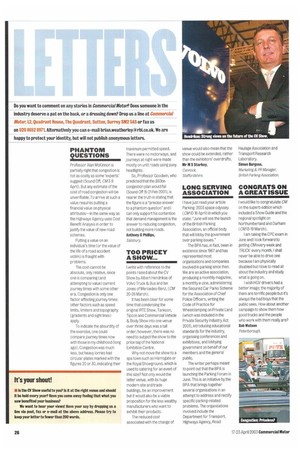PHANTOM QUESTIONS
Page 26

If you've noticed an error in this article please click here to report it so we can fix it.
Professor Alan McKinnon is partially right that congestion is not as costly as some 'experts' suggest (Sound Off, CM 3-9 April). But any estimate of the cost of road congestion will be unverifiable. To arrive at such a value requires putting a financial value on physical attributes—in the same way as the Highways Agency uses Cost Benefit Analysis in order to justify the value of new road schemes.
Putting a value on an individual's time (or the value of the life of a road accident victim) is fraught with problems.
The cost cannot be absolute, only relative, since one is comparing (and attempting to value) current journey times with some other era. Congestion is only one factor affecting journey times: other factors such as speed limits, limiters and topography (gradients and sight lines) apply.
To indicate the absurdity of the exercise, one could compare journey times now with those in my childhood (long ago). Congestion was much less, but heavy lorries had circular plates marked with the figures 20 or 30, indicating their maximum permitted speed. There were no motorways, and journeys at night were made mostly on unlit roads using puny headlights.
So, Professor Goodwin, who predicted that the 160bn congestion plan would fail (Sound Off 15-21 Feb 2001), is nearer the truth in stating that the figure is a "precise answer to a phantom question" and I can only support his contention that demand management is the answer to reducing congestion, not building more roads. Anthony 0 Philips, Salisbury.
































































































































































